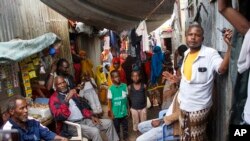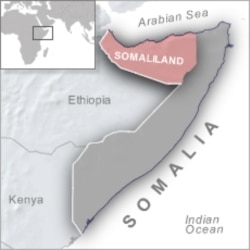Authorities in the self-declared republic of Somaliland reported the territory’s first two cases of coronavirus on Tuesday.
Health officials in the capital, Hargeisa, said samples taken from two individuals — a local man who visited Britain and a Chinese man — had tested positive for COVID-19. Authorities were trying to track down people the men had contact with.
Somaliland declared independence from Somalia in May 1991 but has never received international recognition. The two cases brought the number of confirmed cases in Somalia to five, all of them travel-related.
Awareness campaigns launched
Health officials in Somalia and Somaliland have undertaken separate efforts to restrict travel and public gatherings.
With almost nonexistent primary health services and no labs to test potential coronavirus samples, Somali officials have launched public awareness campaigns to confront the deadly pandemic.
Vehicles mounted with loudspeakers have circulated in Mogadishu with basic information about the virus. The government has distributed leaflets advising people to wash their hands and practice social distancing.
On Tuesday, Somalia’s federal government banned beachgoing and ordered closure of restaurants and bars. The previous day, the government ordered the closure of religious schools and urged the public to perform prayers at home. Last week, public schools and universities were closed.
A suspension of all domestic flights went into effect at midnight Sunday. International flights were already suspended until April 2, but the government has given itself an option to extend that.
After confirmation of the two cases in Somaliland, authorities were still awaiting the results of at least 14 other cases under investigation, seven in the semiautonomous Puntland region and the rest in Mogadishu.
“We have not yet seen any locally transmitted cases, but this situation may change in the future,” Mamunur Rahman Malik, the World Health Organization’s representative and head of mission for Somalia, said in an email to VOA Somali.
Just before the news of the two new cases, health officials celebrated the recovery of the first patient to test positive on March 16.
Malik said the person had shown no symptoms throughout the period and was tested negative on two consecutive samples taken 48 hours apart.
Challenges
Since Somalia does not have a laboratory, samples are taken to a WHO-certified center in neighboring Kenya, which local health professionals said was a huge challenge.
The country has just ordered three machines that can conduct these tests, which are expected to arrive in two to three weeks, Health Minister Fawziya Abikar said.
“Somalia is in a very delicate situation. It has come from longtime civil unrest and political instability. ... The health system is fragile,” said Abikar, who has been the face of the government’s efforts in preparing for COVID-19.
She pointed out that even before the coronavirus, many Somalis had other challenging health problems.
“Already, Somalia is a country where mothers and children die, maternal mortality is very high, child and antenatal mortality is very high, TB [tuberculosis] is prevalent, malaria also,” she said during a VOA Somali interview.
“God forbid, but if we have this pandemic virus, it will be a huge drastic public health problem for the Somali people. The hospitals are not adequate to contain, let us not talk about the ICU units and high-dependency units. Even oxygen is a problem for the time being,” she said.
The Somali government allocated just $5 million for fighting the virus. Most of the nearly $460 million budget for this year will go to security, as the government rebuilds the army and fights the al-Shabab militant group.
Al-Shabab has banned aid agencies from working in their area of control, mainly in the countryside, a matter that could complicate outreach and health awareness campaigns.
This week, al-Shabab commented on the pandemic, calling for “caution” against the coronavirus and other infectious diseases. The group then accused what it called “crusader forces who invaded the country, and disbelieving countries that support them, AMISOM [the African Union Mission in Somalia],” of contributing to the spread.





